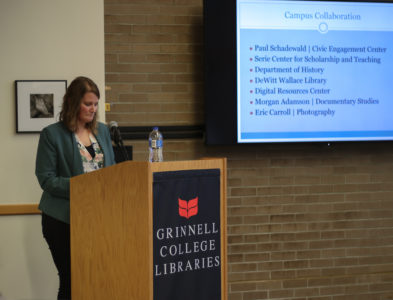
On Friday, Feb. 2, Rebecca Wingo, a Mellon Postdoctoral Fellow in Digital Liberal Arts at Macalester College, hosted a talk entitled “Harvesting History,” along with a complimentary workshop the next day.
In the 1960s, the Minneapolis Department of Transportation built I-94, the highway connecting downtown Minneapolis and St. Paul. It bisected a primarily Black community, destroying their main street and business district, Rondo Avenue. The construction destroyed businesses and homes, and in 2015, the St. Paul mayor apologized, saying that the construction of the highway created a diaspora at the expense of families and the community’s economic prosperity.
In 2016, Wingo designed a class at Macalester College through which students engaged with the Rondo community, employing what she calls a “History Harvest.” It was a harvest, so to speak, in that she asked community members to bring in their artifacts so that the students could digitize them. In doing so, they formed a two-way relationship.
“The community is empowered to stake a claim over their own identity, by telling their story digitally,” Wingo said. The students “[think] through these ideas of civic tech that are really important … as they engage with these technologies and think about the power structures that undergird these as they pursue their own studies.”
During a History Harvest, community members are invited to bring their possessions in, which the Macalester students then scan or photograph. What Wingo emphasized was that participants took their artifacts home as part of a process that democratizes history. As Wingo put it, “the majority of history is with our communities, with our families, and those things aren’t necessarily in museums or archives. … Museums and archives play a role in suppressing histories and marginalizing histories. … Historically they’ve told the stories of wealthy white world.”
The workshop that Wingo hosted sought to offer educators and students resources to conduct their own History Harvests, and to look at technology critically as a tool for enhancing the study of history.
“Digital history is a field of study that uses computational methodologies in either teaching, researching or publication. So this isn’t a replacement of what we call history, it’s something that augments the answers to our questions, or opens new lines of inquiry,” Wingo explained. She elaborated that for historians, “our entire craft is interpreting these artifacts, but we’re limited to what we can find. So, if we can make things more searchable and more findable using these digital means, than we can tell more complete stories.”
Wingo’s presentation offered a look at the value artifacts could hold within a community’s history, and how digitizing these things can be both an act of academia and social justice. In her class’ case, it allows students to broaden their connection to neighborhoods surrounding their college campus and create a skill-set that is ever necessary and expanding in the 21st century.
“The students who engage with these digital technologies are better positioned to advance in any sort of career they want. … If you want to be a player in the world, and if you want to create change and find ways to distribute that new knowledge that students or faculty have created, you have to a) make an accessible, narrative style, and b) make it accessible digitally. That’s how people find things now,” Wingo said.

















































